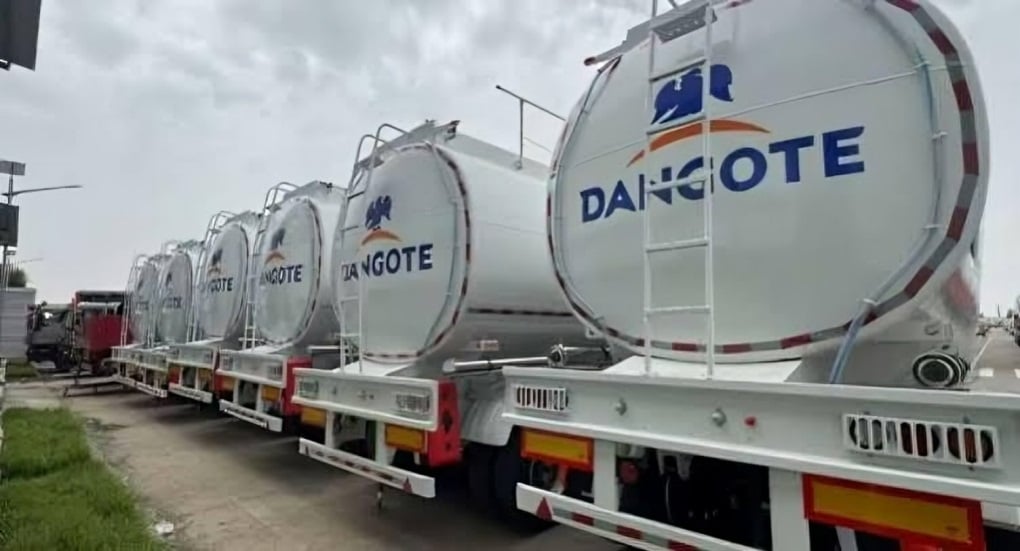Dangote Petroleum Refinery has announced a gargantuan investment of N720 billion to deploy 4,000 Compressed Natural Gas (CNG) trucks across Nigeria, a move expected to save the country over N1.7 trillion annually in fuel transportation costs. The company said the initiative is part of its broader plan to cut distribution expenses, ease the burden on consumers, and support the nation’s struggling economy, especially the 42 million Micro, Small and Medium Enterprises (MSMEs) that depend heavily on fuel for their daily operations.
According to the company, the deployment of the CNG trucks, set to begin operations by August 15, will allow Dangote to deliver petrol and diesel directly to filling stations, large-scale businesses, and industries across the country. By removing multiple layers of middlemen and reducing logistics inefficiencies, the refinery aims to significantly bring down pump prices, reduce inflationary pressures, and enhance fuel availability, particularly in remote and underserved regions.
The company stated that it intends to meet Nigeria’s daily fuel demand of 65 million litres, comprising 45 million litres of petrol, 15 million litres of diesel, and 5 million litres of aviation fuel. With current transportation costs averaging N45 per litre, the new strategy could save the country over N1.07 trillion annually. It is also expected to create more than 15,000 direct jobs across the country through the establishment of CNG filling stations and logistics hubs.
The presidency welcomed the development, describing it as a bold step that aligns with the federal government’s push towards alternative energy and a more sustainable transport system. Tosin Coker, the Commercial Coordinator of the Presidential Compressed Natural Gas Initiative (PCNGI), praised the investment as timely and transformative. “It signals to the market that CNG is no longer a distant prospect but a current, practical solution to high energy costs, emissions, and supply chain challenges,” Coker said. “PCNGI regards this as a milestone achievement in our efforts to accelerate gas-powered transport adoption.”
The Independent Petroleum Marketers Association of Nigeria (IPMAN) also applauded the refinery’s move, calling it a major relief for independent marketers grappling with high logistics costs due to non-functional pipelines. Chinedu Ukadike, IPMAN’s National Publicity Secretary, noted that the logistics challenge had persisted for years without meaningful intervention. “Our pipelines have been non-functional for years, yet nothing has been done to revive the infrastructure linking the country’s 21 depots. We’ve had to rely on expensive transport from coastal depots,” he said.
“Dangote’s intervention lifts a huge burden off the shoulders of independent marketers.”
Economic experts have likewise lauded the initiative, describing it as a structural reform with the potential to reset the downstream sector. Professor Ken Ife, a development economist, said the new distribution model would lower petrol prices and support economic recovery by reducing cost pressures on businesses. In the same vein, renowned economist Bismarck Rewane dismissed fears of monopoly, emphasizing that the initiative eliminates wasteful middlemen from the supply chain. “What Dangote is doing achieves two key objectives: delivering products at a uniform price nationwide by eliminating bridging costs, and significantly reducing logistics expenses through CNG-powered trucks,” Rewane said. “Middlemen—who typically do not invest—are often viewed as parasitic. Dangote is bypassing this layer by directly handling distribution and offering credit to the retail market.”
Kelvin Emmanuel, an energy expert and co-founder of Dairy Hills, described the plan as long overdue. He argued that Nigerians had waited too long to see the real impact of domestic refining and direct product delivery. Another analyst, Ibukun Phillips, said the move would help eliminate disparities in fuel pricing and availability across the country. “Rural consumers, who typically pay more despite earning less, stand to benefit immensely. This could also revive abandoned filling stations and promote equitable distribution,” she noted.
Dangote Refinery’s venture into CNG-powered logistics is not only expected to reduce the cost of fuel distribution but also to catalyse a more efficient and environmentally friendly energy ecosystem. As Nigerians continue to grapple with rising living costs, the refinery’s bold investment signals a new chapter in the nation’s pursuit of energy efficiency, affordability, and inclusive economic growth.
















Leave a comment